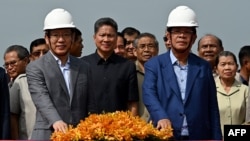ໂຄງການພັດທະນາດ້ານພື້ນຖານໂຄງລ່າງຕ່າງໆທີ່ໄດ້ຮັບທຶນຈາກຈີນ ຢູ່ໃນກຳ ປູເຈຍ ແມ່ນມີຫຼາຍປະເພດ ປົນກັນໄປສຳລັບປະເທດນີ້ ຂະນະທີ່ບາງຄົນເຫັນພວກມັນເປັນໂອກາດດີທີ່ຈະປັບປຸງພື້ນຖານໂຄງລ່າງທີ່ຊຸດໂຊມຂອງປະເທດໄດ້ ແລະໃນຂະນະດຽວກັນຄົນອື່ນໆກໍໄດ້ມີຄວາມເປັນຫ່ວງກ່ຽວກັບເສດຖະກິດຂອງກຳປູເຈຍ ທີ່ຕ້ອງເພິ່ງພາອາໄສຈີນ ອີງຕາມບັນດານັກວິເຄາະ.
ນຶ່ງເດືອນກ່ອນໜ້າການເລືອກຕັ້ງແຫ່ງຊາດຂອງກຳປູເຈຍ ນາຍົກລັດຖະມົນຕີ ຮຸນ ເຊນ ໄດ້ປະກາດໂຄງການພື້ນຖານໂຄງລ່າງທີ່ສຳຄັນຫຼ້າສຸດ ໂດຍໄດ້ຮັບທຶນຈາກປັກກິ່ງ ຊຶ່ງເປັນໂຄງການທາງດ່ວນທີ່ເຊື່ອມຕໍ່ພະນົມເປັນກັບບາເວັດ ຢູ່ເຂດຊາຍແດນຕິດກັບຫວຽດນາມ ທາງພາກຕາເວັນອອກຂອງປະເທດ.
ທາງໄລຍະ 135 ກິໂລແມັດນີ້ ຈະມີລາຄາປະມານ 1 ພັນ 37 ຮ້ອຍລ້ານໂດລາ ແລະຕິດຕາມດ້ວຍການເປີດທາງດ່ວນມູນຄ່າ 2 ພັນລ້ານໂດລາ ທີ່ໄດ້ຮັບທຶນຈາກຈີນ ທີ່ເຊື່ອມຕໍ່ ພະນົມເປັນ ກັບ ສີຫານຸກວີລ ຊຶ່ງເປັນເມືອງທ່າແຄມທະເລທີ່ສຳຄັນຂອງປະເທດ ເມື່ອປີກາຍນີ້.
“ທາງດ່ວນນີ້ ຈະສຳເລັດກ່ອນທີ່ຂ້າພະເຈົ້າຕາຍ” ທ່ານຮຸນ ເຊນ ໄດ້ກ່າວໃນພິທີວາງສີລາເລີກສຳລັບ ທາງຫຼວງຈາກພະນົມເປັນ ຫາ ບາເວັດ ໃນກາງເດືອນມິຖຸນານີ້.
ໃນຊ່ວງເວລາຂອງການປະກາດດັ່ງກ່າວ ເປັນການເນັ້ນຢ້ຳການເພິ່ງພາຂອງທ່ານຮຸນ ເຊນ ຕໍ່ປັກກິ່ງ ເພື່ອບັນລຸຄວາມກ້າວໜ້າດ້ານເສດຖະກິດ ຂະນະທີ່ທ່ານຍັບໃກ້ເຂົ້າການກຳອຳນາດມາໄດ້ເກືອບສີ່ທົດສະວັດ ອັນເປັນຄວາມສຳພັນທີ່ບັນດານັກວິເຄາະ ເຕືອນວ່າ ເຮັດໃຫ້ພະນົມເປັນໜີ້ບຸນຄຸນຕໍ່ປັກກິ່ງ.
China-funded development projects in Cambodia are a mixed bag for the country as some see them as an opportunity to improve the country’s poor infrastructure while others raise concerns about Cambodia’s economic dependence on China, according to analysts.
A month before Cambodia’s national elections, Prime Minister Hun Sen announced the latest major infrastructure project financed by Beijing, an expressway connecting Phnom Penh to Bavet on the country’s eastern border with Vietnam.
The 135-kilometer road will cost an estimated $1.37 billion and follows the opening of a $2 billion China-funded expressway connecting Phnom Penh to Sihanoukville, Cambodia’s major ocean port city, last year.
“The expressways will be done before I die,” Hun Sen said in a groundbreaking ceremony for the Phnom Penh-Bavet highway in mid-June.
The timing of the announcement underlines Hun Sen’s reliance on Beijing to deliver economic progress as he nears four decades in power, a relationship that analysts warn is leaving Phnom Penh beholden to Beijing.




